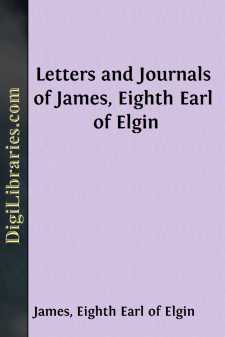Categories
- Antiques & Collectibles 13
- Architecture 36
- Art 48
- Bibles 22
- Biography & Autobiography 813
- Body, Mind & Spirit 142
- Business & Economics 28
- Children's Books 15
- Children's Fiction 12
- Computers 4
- Cooking 94
- Crafts & Hobbies 4
- Drama 346
- Education 46
- Family & Relationships 57
- Fiction 11828
- Games 19
- Gardening 17
- Health & Fitness 34
- History 1377
- House & Home 1
- Humor 147
- Juvenile Fiction 1873
- Juvenile Nonfiction 202
- Language Arts & Disciplines 88
- Law 16
- Literary Collections 686
- Literary Criticism 179
- Mathematics 13
- Medical 41
- Music 40
- Nature 179
- Non-Classifiable 1768
- Performing Arts 7
- Periodicals 1453
- Philosophy 64
- Photography 2
- Poetry 896
- Political Science 203
- Psychology 42
- Reference 154
- Religion 513
- Science 126
- Self-Help 84
- Social Science 81
- Sports & Recreation 34
- Study Aids 3
- Technology & Engineering 59
- Transportation 23
- Travel 463
- True Crime 29
Letters and Journals of James, Eighth Earl of Elgin
Description:
Excerpt
CHAPTER I.
EARLY YEARS.
BIRTH AND PARENTAGE—SCHOOL AND COLLEGE—TASTE FOR PHILOSOPHY—TRAINING FOR PUBLIC LIFE—M.P. FOR SOUTHAMPTON—SPEECH ON THE ADDRESS—APPOINTED GOVERNOR OF JAMAICA.
[Sidenote: Birth and parentage.]
James, eighth Earl of Elgin and twelfth Earl of Kincardine, was born in London on July 20, 1811. His father, whose career as Ambassador at Constantinople is so well known in connection with the 'Elgin Marbles,' was the chief and representative of the ancient Norman house, whose hero was 'Robert the Bruce.' From him, it may be said that he inherited the genial and playful spirit which gave such a charm to his social and parental relations, and which helped him to elicit from others the knowledge of which he made so much use in the many diverse situations of his after-life. His mother, Lord Elgin's second wife, was a daughter of Mr. Oswald, of Dunnikier, in Fifeshire. Her deep piety, united with wide reach of mind and varied culture, made her admirably qualified to be the depositary of the ardent thoughts and aspirations of his boyhood; and, as he grew up, he found a second mother in his elder sister, Matilda, who became the wife of Sir John Maxwell, of Pollok. To the influence of such a mother and such a sister he probably owed the pliancy and power of sympathy with others for which he was remarkable, and which is not often found in characters of so tough a fibre. To them, from his earliest years, he confided the outpourings of his deeper religious feelings. One expression of such feeling, dated June 1821, may be worth recording as an example of that strong sense of duty and affection towards his brothers, which, beginning at that early age, marked his whole subsequent career. 'Be with me this week, in my studies, my amusements, in everything. When at my lessons, may I think only of them; playing when I play: when dressing, may I be quick, and never put off time, and never amuse myself but in playhours. Oh! may I set a good example to nay brothers. Let me not teach them anything that is bad, and may they not learn wickedness from seeing me. May I command my temper and passions, and give me a better heart for their good.'
[Sidenote: School and college.]
He learned the rudiments of Latin and Greek under the careful teaching of a resident tutor, Mr. Fergus Jardine. At the age of fourteen he went to Eton, and thence, in due time, to Christ Church, Oxford, where he found him self among a group of young men destined to distinction in after-life —Lord Canning, James Ramsay (afterwards Lord Dalhousie), the late Duke of Newcastle, Sidney Herbert, and Mr. Gladstone.
There is little to record respecting this period of his life; but a touching interest attaches to the following extracts from a letter written by his brother, Sir Frederick Bruce, in November, 1865.
'My recollections of Elgin's early life are, owing to circumstances, almost nothing. In the year 1820 he went abroad with my father and mother, and was away for two years. From that time I recollect nothing until he went to Eton; and his holidays were then divided between Torquay, where my eldest brother was, and Broomhall;[1] and of them my memory has retained nothing but the assistance in his later holidays he used to give me in classical studies....


